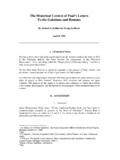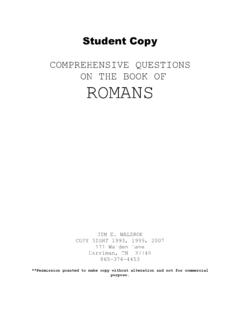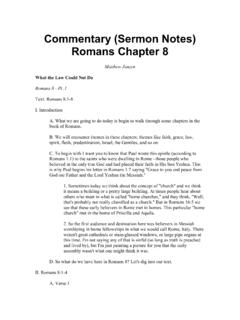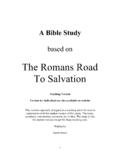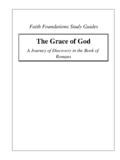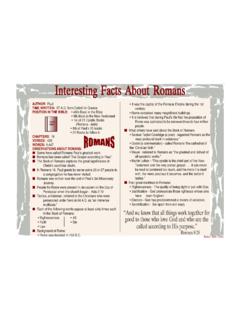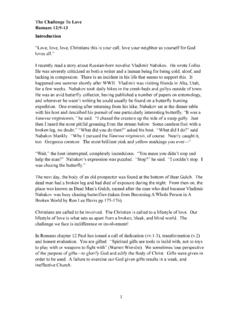Transcription of Paul’s View of the Law in Galatians and Romans
1 Paul s View of the Lawin Galatians and RomansBy Andrew S. Kulikovsky (Hons)June 30, 1999 I. INTRODUCTIONPaul s view of the Law is probably the most debated topic in New Testament studies1and Daniel Wallace notes that [t]he problems and apparent contradictions in Paul sview of the Law are legion. 2 Some commentators believe that Paul changed his view of the Law considerablybetween writing Galatians and However, a careful analysis of Paul sstatements about the Law in both letters will show that they are complementary, notcontradictory. On the other hand, Sanders posited that Paul had no theology of the Lawbut merely responded in various ways to various circumstances which threatened hismission to the Jews and Gentiles. This is why he proclaimed the necessity ofparticipation in Christ for one views Paul s understanding of the Law, it should be noted that neitherGalatians nor Romans are formal, systematic discussions of the Law.
2 Rather, they aread hoc documents dealing with specific pastoral Nowhere in the NewTestament is there a complete discussion, so all we can do is make extrapolations fromwhatever Paul does 1 K Snodgrass, Spheres of Influence: A Possible Solution to the Problem of Paul and the Law ,Journal for the Study of the New Testament 32 (1988) D B Wallace, Galatians 3:19-20: A Crux Interpretum for Paul s View of the Law , WestminsterTheological Journal 52 (Fall 1990) G N Stanton, The Law of Moses and the Law of Christ , in Paul and the Mosaic Law, editedby J D G Dunn (Tubingen: J C B Mohr, 1996) F Thielman, Law in Dictionary of Paul and His Letters, edited by G F Hawthorne, R P Martin& D G Reid (Downers Grove, Illinois: IVP, 1993) Snodgrass Ibid s View of the Law in Galatians and RomansPage 2 II. THE LAW AND THE ABRAHAMIC COVENANT 1. The promise made to AbrahamGod promised Abraham that he and his offspring would eventually receive as an eternalinheritance the land in which he was now living as an alien (Gen 12:7, 13:15, 17:7-8).
3 Therefore, the Jew s inheritance is based on God s promise, not on the Law (cf. Gal3:15-18). God s covenant with Abraham was based on faith and was not set aside orsupplemented by the Law. Indeed, the Law was not issued until 430 years after theAbrahamic covenant was established (Gal 3:17).This point is reiterated in Romans 4:13-14: the promise did not come through the Law,but through faith. 2. The Law and the JewsIn light of Romans 2:17-24, the Jews were apparently claiming that their knowledge andpossession of the Law made them superior. The boasting described here is mostprobably the belief that ethnic Israel is inalienably the people of the one true God andthat her possession of the law, quite irrespective of her keeping of it, demonstrates thisfact. 7 Paul, however, takes these people to task and exposes their hypocrisy. It is clearthat the series of rhetorical questions in vv. 21-23 require negative answers.
4 Despitetheir knowledge of the Law, the Jews still broke it, and God s name is blasphemedamong the Gentiles because of it (v. 24). Knowledge of the Law is of no value unless itis accompanied by Thus, the offence which the Jews have committed is thebreaking of the because the Jews have the Law does not mean they are righteous, or that they didnot need to exercise faith. Although Leviticus 18:5 states that those who keep God slaws will live by them, T. R. Schreiner suggests that this does not teach that Israelshould obey the Law in order to earn salvation, but rather, that obedience to the Lawwould be the intended result of God s saving work. He also points out that sincesacrifices could be offered for sins committed, there would have been no thought thatthe Law could be obeyed perfectly, resulting in for righteousness was a legitimate goal for the people of Israel.
5 The goal wasnot wrong, but the path the people chose ( works) was. The only way to achieverighteousness is by 7 N T Wright, Law in Romans 2 , in Paul and the Mosaic Law, edited by J D G Dunn (Tubingen:J C B Mohr, 1996) R B Hays, Three Dramatic Roles , in Paul and the Mosaic Law, edited by J D G Dunn(Tubingen: J C B Mohr, 1996) T R Schreiner, Paul s View of the Law in Romans 10:4-5 , Westminster Theological Journal55 (Spring 1993).10 Snodgrass s View of the Law in Galatians and RomansPage 3 3. CircumcisionGenesis 17:11 makes it clear that circumcision was a sign of the covenant between Godand Abraham and his descendants. However, it appears that a number of early Jewishbelievers were insisting that their uncircumcised fellow believers should also Paul, however, vehemently opposes this idea (Gal 5:2-4). In Romans4:9-12, Paul gives a calmer and a much more reasoned response to this issue.
6 He pointsout that Abraham was declared righteous before he was circumcised. He received thecircumcision as a sign and a seal of the righteousness he had by faith when he was stilluncircumcised. Therefore, he is the father of all believers who have not raises the question: what is the point of circumcision? Not only that but why is itno longer necessary -- especially since it symbolises the Abrahamic covenant? InRomans 2:25-29, Paul argues that circumcision is only of value if the person obeys theLaw, otherwise it is of no value at all. Indeed, he goes on to state that an uncircumcisednon-Jew12 who obeys the Law s requirements is more of a Jew than a truly ethnic Jewwho does not obey the is unlikely that Paul was against circumcision altogether. His opposition to it wasprimarily motivated by those who believed that circumcision was necessary forsalvation and a right relationship with God.
7 In answer to the question of the value ofcircumcision in Romans 3:1, Paul responds positively. Circumcision is a symbol (andthat is all it is) which identifies the Jews as those people who have been entrusted withthe very words of God. As Stanton comments: Paul removes circumcision and the Lawfrom the pedestal on which they had been placed. 13 Note also that Paul had no problem with circumcising Timothy (Acts 16:3) for the sakeof the unbelieving Jews around Lystra and Iconium, so that his mission to them wouldnot be hindered. III. THE CURSE OF THE LAW 1. An unattainable standardIn Galatians 3:10-13, Paul states that anyone who relies on observing the Law in orderto gain salvation is cursed because Deuteronomy 27:26 states: Cursed is everyonewho does not continue to do everything written in the Book of the Law. This quotationclearly implies that it is simply impossible for someone to continue to do everythingwritten in the Book of the Law.
8 14 The Law is an unattainable standard because no-onehas the capacity to be completely obedient all the time. 11 See Gal 5:1-11, 6:12. Also, cf. Acts 15 Wright (134-135) points out that here Paul is speaking of Gentile Christians. The language of2:29 is similar to that of 7:6, 2 Cor 3:6 and Phil 3:3, where Paul is clearly talking Stanton, Ibid s View of the Law in Galatians and RomansPage 4It is only through Christ becoming a curse for us, that we may be redeemed. 2. SlaveryIn Galatians 4:22-31, Paul uses the sons of Abraham as an analogy to communicate thatthe Law brings slavery. The mother of each son represents the two covenants: Hagar,the slave woman, represents the Mosaic covenant (the Law) and Sarah, a free woman,represents the Abrahamic covenant (the promise). Hagar s son, Ishmael, is a child ofslavery, but Sarah s son, Isaac, is a child of the promise.
9 The slave woman s son willnever share in the inheritance of the free woman s son. In a figurative sense, Christiansare therefore children of the free woman, and are made righteous through faith notthrough slavishly observing the Romans 7:14-25, Paul shares his own personal struggles with the slavery that isbrought about by the Law and sin. He finds himself in the predicament of doing what hedoes not want to do, and not doing what he does want to do. Paul asserts that this iscaused by the Law being at work in the members of his body, making him a prisoner ofthe Law of sin. In the realm of his body, Paul is a slave to the Law of sin ( the Lawwhich brings about sin).In addition, Cranfield points out that the Law encourages legalism -- an arrogantconfidence of being able to fulfil it,15 which ultimately leads to Christianshave been set free from the bondage of sin to be free not to become slaves again (Gal5:1).
10 3. Sin and deathBecause the Law is an unattainable standard and because it results in slavery, it isidentified as the Law of sin and death (Rom 8:2). It brings wrath by creating thenecessary conditions for culpability knowledge of good and evil (cf. Rom 4:15;5:13)17 and then demands a righteousness which it has no power to produce (cf. Rom8:3-4).18 Because no human being is able to meet the Law s requirements, all areunrighteous, and therefore deserve God s condemnation and essence, sin works through the flesh and uses the Law to cause However, theLaw was not meant to be this way. Paul points out in Romans 7:13 that sin has co-optedLaw and pressed it into a service for which it was not originally intended. Sin hascommandeered Law and now uses it to accomplish 15 C E B Cranfield, Romans vol. II (Edinburgh: T & T Clark, 1979) Ibid Hays Cranfield, Romans vol.
